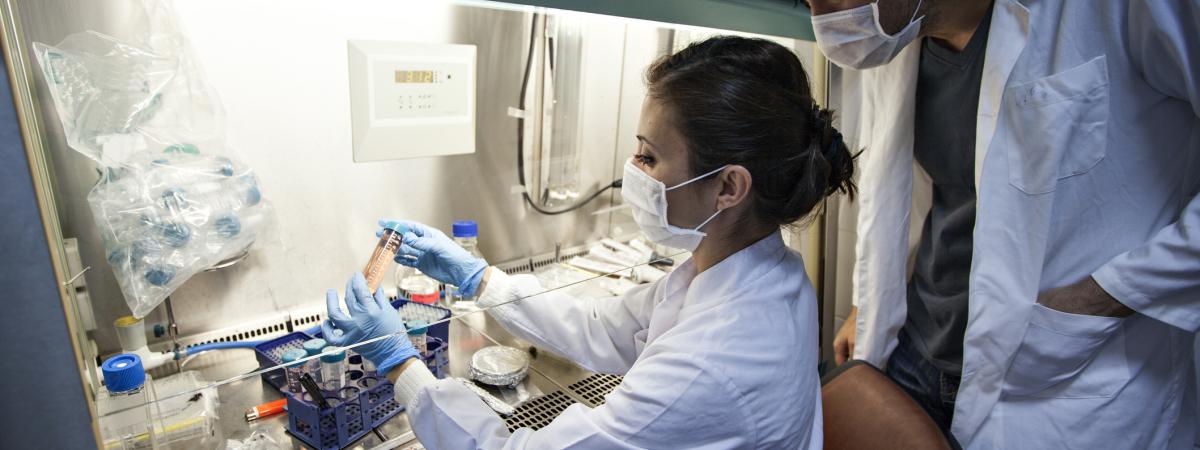During the first semester, you will embark on lab rotations alongside research faculty, participate in coursework with your peers, and select one of the eleven biomedical PhD programs of your choice. The BSTP program begins in July, so we encourage you to arrive as early as possible to complete a research rotation before classes begin. You'll complete at least three rotations, learn new techniques and get to know the faculty. During the lab rotations, you will attend journal clubs, research seminars, and lab meetings.
Curriculum Details
- You will have an academic advisor who will help set up rotations.
- In the middle of the first year, you’ll choose the thesis advisors and join one of our 11 BSTP PhD programs. Your research interests are the primary factor in this choice.
- Most students take our course in cell and molecular biology IBMS 453 & IBMS 455. It offers an introduction to modern cell and molecular biology and provides a strong foundation for research in all of the PhD programs of the BSTP. (Students with master’s degrees can place out of this course and take more advanced offerings.)
- If you have strong quantitative skills in physics or math but limited biology exposure, you may be guided instead to cell physiology courses including PHOL 432, PHOL 456.
| Course Code | Course Name |
|---|---|
| IBMS 457 | Basics of AI and Data Science in BioMedicine |
| IBMS 453 | Cell Biology I |
| IBMS 455 | Molecular Biology I |
| BSTP 400 | Research Rotation in BSTP |
| IBMS 500 | On Being a Professional Scientist: The Responsible Conduct of Research |
This course focuses on cutting-edge computational methods in biomedical research. Moving beyond traditional biostats approaches, the curriculum emphasizes AI, machine learning, and state-of-the-art techniques in genomics and transcriptomics. Topics range from spatial transcriptomics and single-cell sequencing analysis to mathematical modeling of cancer treatments. The course is broken into three main sections. The first month will focus on 'fundamentals' of bioinformatics: during this section, students will be introduced to the range of bioinformatic approaches currently being used, from the techniques themselves, to analysis methods, to interpreting results. The second section will be a hands-on 'coding bootcamp' which will be four hands-on practical sessions using Google Colaboratory and markdown style coding notebooks. Students who are already proficient coding in either Python or R will have the option to complete a packet of take home assignments in lieu of the bootcamp. In the final section of the course, we will give students a tour of a series of special topics in applications of AI and machine learning to biomedicine. Topics will range from ethics of AI to radiomics and medical imagine, to mathematical modeling of tumor and pathogen growth and evolution. We hope that this structure will allow students to gain an appreciation of the kind of research questions that are pursued and the diversity of methods used to analyze large, complex, biological data. This course aims to prepare students for the evolving landscape of computational biology and its applications in molecular and biomedical research.
Part of the first semester curriculum for first year graduate students along with IBMS 455. This course is designed to give students an intensive introduction to prokaryotic and eukaryotic cell structure and function. Topics include membrane structure and function, mechanisms of protein localization in cells, secretion and endocytosis, the cytoskeleton, cell adhesion, cell signaling and the regulation of cell growth. Important methods in cell biology are also presented. This course is suitable for graduate students entering most areas of basic biomedical research. Undergraduate courses in biochemistry, cell and molecular biology are excellent preparation for this course. Recommended preparation: Undergraduate biochemistry or molecular biology.
Part of the first semester curriculum for first year graduate students along with IBMS 453. This course is designed to give students an intensive introduction to prokaryotic and eukaryotic molecular biology. Topics include protein structure and function, DNA and chromosome structure, DNA replication, RNA transcription and its regulation, RNA processing, and protein synthesis. Important methods in molecular biology are also presented. This course is suitable for graduate students entering most areas of basic biomedical research. Undergraduate courses in biochemistry, cell and molecular biology are excellent preparation for this course. Recommended preparation: Undergraduate biochemistry or molecular biology.
This course is designed to provide first-year students in the Biomedical Sciences Training Program (BSTP) with a formal record of their required research rotations. Students will engage in multiple laboratory rotations during their first summer and fall semesters, gaining exposure to a variety of research environments, techniques, and methodologies. The course is graded on a pass/fail basis, with a passing grade contingent upon the successful completion and documentation of all required rotations. This course is mandatory for all first-year BSTP students.
The goal of this course is to provide graduate students with an opportunity to think through their professional ethical commitments before they are tested, on the basis of the scientific community's accumulated experience with the issues. Students will be brought up to date on the current state of professional policy and federal regulation in this area, and, through case studies, will discuss practical strategies for preventing and resolving ethical problems in their own work. The course is designed to meet the requirements for "instruction about responsible conduct in research" for BSTP and MSTP students supported through NIH/ADAMHA institutional training grant programs at Case. Attendance is required.


